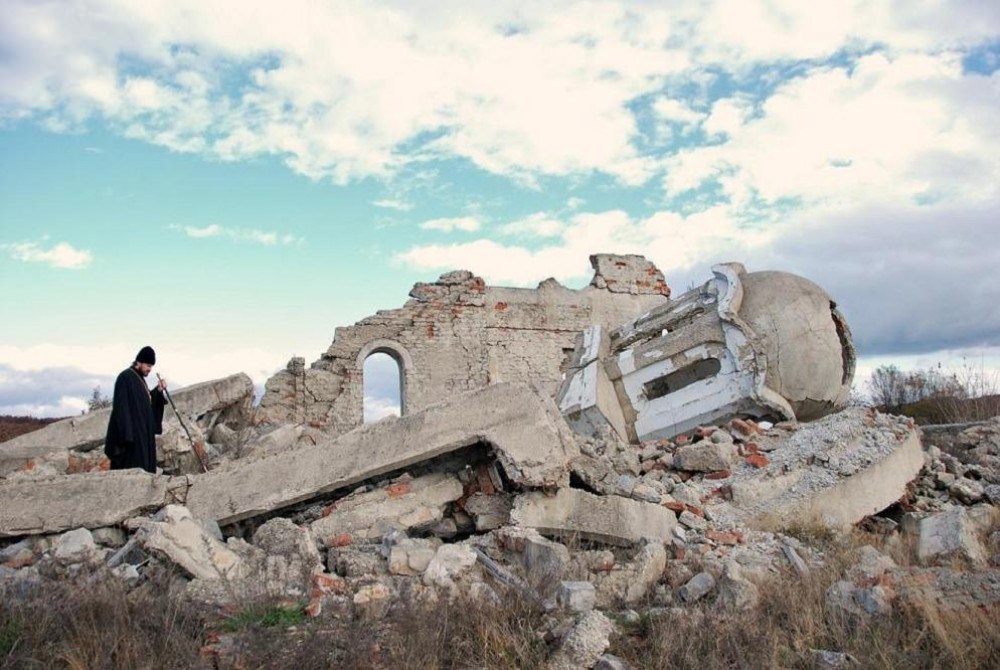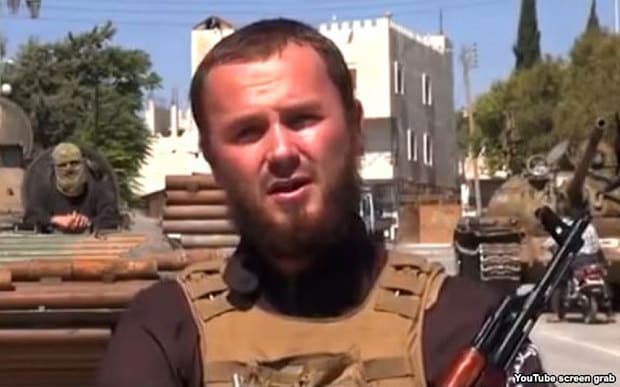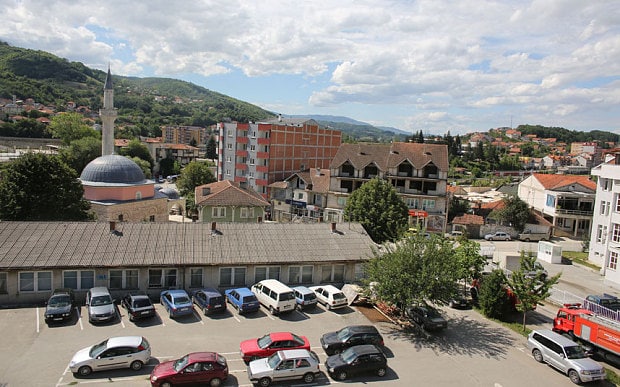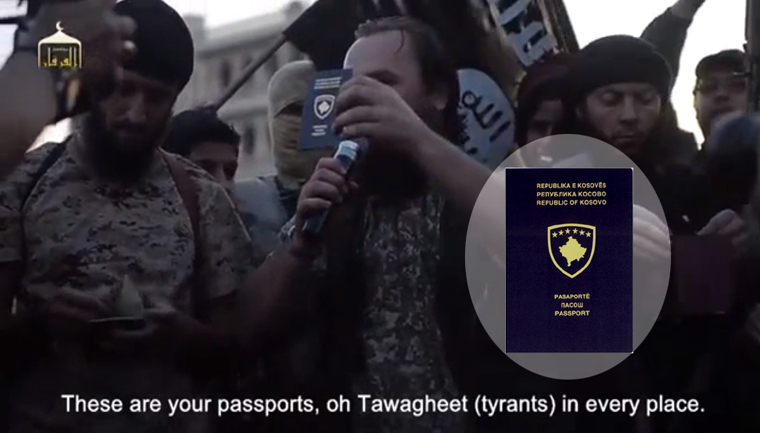
Views: 1995
Nestling in a wooded valley that its citizens laid their lives down to defend, the town of Kacanik in southern Kosovo is fiercely proud of its war dead.
Well-kept cemeteries include nearly 100 victims of Serb-led ethnic cleansing in 1999, while in the town centre, a statue clutching an RPG honours fallen members of Brigade 162 of the Kosovan Liberation Army.
But a decade and a half on from the war that brought about Kosovo’s independence, there is rather less pride in Kacanik’s new crop of warriors.
In the last three years, some 24 local menfolk have gone to fight for jihadist groups in Syria and Iraq, giving the town of just 30,000 people an unwanted reputation as the jihadist capital of the Balkans.
To add to the sense of shame, one of them, a 25-year-old recruiter named Lavdrim Muhaxheri, has committed atrocities as gruesome as any of those carried out in Kacanik in 1999, when British troops unearthed a mass grave containing 81 bodies.
Last summer, in an act that sent shockwaves across Kosovo, Muhaxheri posted Facebook pictures of himself apparently beheading another man suspected of spying against the Islamic State. Another shows him executing a Syrian man using an RPG.
“Muhaxheri has given Kacanic a name as the most radical city in Kosovo, if not the whole Balkans,” said Musli Verbani, a local imam, who claims that hardliners forced him from Kacanik’s Islamic Association four years ago. “I warned that this kind of thing was coming, but no-one listened.”
Kosovo, of course, is not alone among European nations in acquiring its own equivalent to Britain’s Jihadi John. But for a nation of just 1.8 million people, it now punches well above its weight in terms of the number of citizens joining Isil.
The interior ministry estimates that some 300 Kosovans have followed in Muhaxheri’s’ footsteps, making Kosovo Europe’s biggest contributor per capita. Along with neighbouring Albania, which has fielded around 200, and nearby Bosnia, which around 160, it is now seen as a potential launch pad for Isil in its bid to establish a new front against Europe in the Balkans.
What also alarms Western security officials, though, is why any Kosovans would join Isil’s fanatics at all.
After all, back in 1999, it was the West that rescued Kosovo’s mainly Muslim population, with Nato bombing raids that halted the campaign of ethnic cleansing by Serb extremists.
Since then it has been staunchly pro-Western, with the capital, Pristina, boasting both a statue of Bill Clinton and a road named after George W Bush, who was president when Kosovo formally gained independence in 2008. There are even young Kosovans named “Tony” in honour of Tony Blair.
Most Kosovans also follow moderate Islam that allows bars on the same street as mosques, and which is enshrined in a new constitution promoting the diversity suppressed during Communism.
Yet those same liberal values have also allowed less tolerant voices to flourish, including hardline Islamic charities that arrived during the chaotic post-civil war years.
Such is the foothold of radicalism in towns like Kacanik that last week, its modest town hall received a personal visit from Kosovo’s interior minister, Skender Hyseni.
Kačanik in Southern Serbia’s province of Kosovo
Kacaniku in southern Kosovo where some residents have left to fight in Syria. To the left is the mosque where Imam Musli Verbani was forced from by extremists Photo: Will Wintercross
“Kosovo is a multi-cultural state, not a terrorist one,” he told assembled officials, speaking at a conference table decked out with the American and Kosovan flags. “Those going overseas are joining groups that spread violence and terror.”
In its defence, the Kosovan government argues that other European nations actually have higher rates of radicalisation if it is counted per head of Muslim population.
But since Muhaxheri’s shocking Facebook post last summer, Mr Hyseni has backed words with action, arresting around 100 suspected extremists, including the grand mufti of the main central mosque in Pristina.
Prosecutions are already pending of various recruiting networks, including one that passed messages via go-betweens at a kebab shop near the Bill Clinton statue.
It is, however, already too late, according to Mr Verbani, the Kacanik imam.
A former KLA fighter, he personifies the moderate face of Kosovan Islam. He studied in Cairo and speaks fluent Arabic, yet looked just like another drinker in the cafe bar where he met The Telegraph, wearing neither a beard nor robes.
It was precisely that secular outlook that he found himself having to defend as far back as 2006, when a confrontation with a young local radical named Jeton Raka turned violent.
“At first Jeton was just another good Kacanik kid, but he became more extremist by the day,” said Mr Verbani. “He said the government of Kosovo was against faith, and that school taught children to be unbelievers. I told him he couldn’t speak like that at my mosque, and eventually he came to my house, saying ‘I will burn you and your family’, and petrol bombed my car. Even then, though, the municipality and the police didn’t help me.”
Raka is now believed to be in Syria along with Muhaxheri, while the government crackdown has largely driven the rest of Kacanik’s radical fringe out of town. Even so, locals remain reluctant to talk about the town’s most infamous son, although in such a small community, most know someone now fighting abroad.
Among them is Sadek Dema whose nextdoor neighbour, Hetem Dema, 41, was killed in January after apparently going to fight with Isil’s rival al-Qaeda faction Jabat al-Nusra.
“He fought in the KLA and was always a good and religious man, although he never showed signs of being radical,” said Mr Dema, as Hetem’s five year-old son, Harith, cycled past on his bicycle.
“Nobody is my father now,” Harith shouted out, before Mr Dema could usher him out of earshot. “Now my uncles look after me.”
Quite why Kacanik in particular has become such a hotbed of radicalism is unclear. Some cite its closeness to the border with Macedonia, where they say hardline preachers remain unchecked. Others blame the same lack of prospects that blight everywhere in Kosovo, where the annual GDP is only £2,500 and where youth unemployment is up to 60 per cent.
That same poverty, they also point out, has made Kosovo fertile ground for Islamic charities from the likes of Saudi Arabia, which offer education and welfare programs but also peddle a hardline vision.
Arbana Xharra, a Kosovan journalist who has investigated their activities, says that anyone who speaks ill of them can find themselves denounced and threatened as “Islamophobic”.
“I’ve had to change my kids’ school after I got messages online from people saying they would cut my children’s throats – they even knew what time they went to class,” she said.
Like many moderate Kosovans, she also points the finger at Turkey, whose Islamist government has funded networks of mosques across its Ottoman-era provinces of Kosovo, Bosnia and Albania. And while the Turkish government has denied recent claims that has offered tacit support for Isil in Syria, Kosovans are not the only ones to voice concerns.
One senior diplomat from a moderate Arab regime recently told The Telegraph that radicalism would foster in the Balkans as long as Turkey’s influence remained unchecked. “The EU’s best chance s to get countries Kosovo and Albania into its club,” he warned.
That is a view echoed by Ramadan Ilazi, Kosovo’s 30-year-old deputy minister for EU integration, who says the EU is being too slow in accepting Kosovo’s membership bid. Kosovo’s constitution, he says, is everything that a liberal EU bureaucrat could want, complete with a national anthem that has only music rather than words so “as not to offend anyone”.
Yet to this day, Kosovans cannot even travel to Europe without visa, giving small town youth in places like Kacanik little chance to broaden their horizons.
“Kosovo was built as an antidote to nationalism and the causes of the war,” said Mr Ilazi, who has a picture on his office wall of him shaking President Clinton’s hand as a 14-year-old boy. “But when people don’t see tangible results of their desire to become part of Europe, that allows radicals to suggest that Europe doesn’t want us.”
Still, with Kosovo still also suffering problems with corruption and organised crime, and with Brussels suffering enlargement fatigue, most estimates are that it may be another decade before Pristina enters the Brussels club. That, gives the radicals plenty more time to urge men in towns like Kacanik to head East rather than West.
Originally published on 2015-08-23
Author: Colin Freeman, Chief Foreign Correspondent
Source: The Telegraph
Origins of images: Facebook, Twitter, Wikimedia, Wikipedia, Flickr, Google, Imageinjection, Public Domain & Pinterest.
Read our Disclaimer/Legal Statement!
Donate to Support Us
We would like to ask you to consider a small donation to help our team keep working. We accept no advertising and rely only on you, our readers, to keep us digging the truth on history, global politics and international relations.
FOLLOW US ON OUR SOCIAL PLATFORMS











